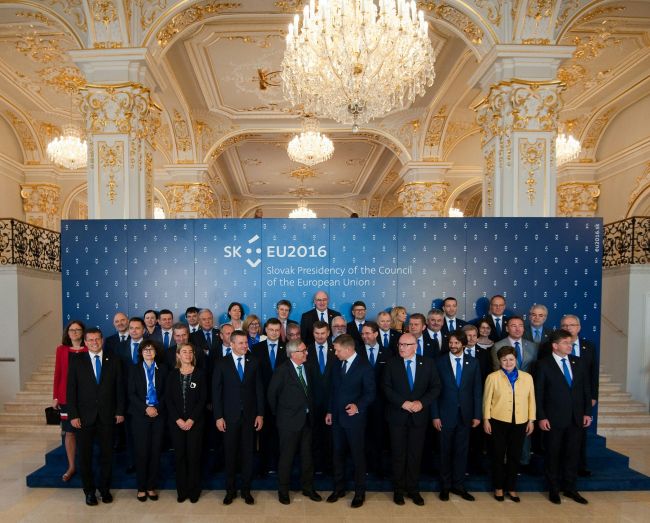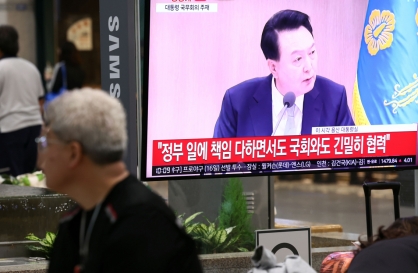S&P cuts EU rating as warnings grow on Brexit’s impact
By Korea HeraldPublished : July 1, 2016 - 20:46
Ratings agency Standard and Poor‘s cut the credit rating for the European Union by one notch on Thursday saying that the bloc had grown more uncertain after Brexit.
“After the decision by the U.K. electorate to leave the EU as a consequence of the June 23 consultative referendum, we have reassessed our opinion of cohesion within the EU, which we now consider to be a neutral rather than positive rating factor,” the agency said in a statement.
According to the statement, S&P cut the EU’s rating to “AA,” still the third highest possible level, from “AA+” with a stable outlook, which signifies that the agency believes no further cut would be necessary in the medium-term.
On Monday, both S&P and Fitch downgraded Britain‘s rating citing last week’s referendum that decided an exit from the EU. S&P cut the country‘s rating from the top ”AAA“ to “AA,” while Fitch lowered its rating from “AA+” to “AA.”
“After the decision by the U.K. electorate to leave the EU as a consequence of the June 23 consultative referendum, we have reassessed our opinion of cohesion within the EU, which we now consider to be a neutral rather than positive rating factor,” the agency said in a statement.
According to the statement, S&P cut the EU’s rating to “AA,” still the third highest possible level, from “AA+” with a stable outlook, which signifies that the agency believes no further cut would be necessary in the medium-term.
On Monday, both S&P and Fitch downgraded Britain‘s rating citing last week’s referendum that decided an exit from the EU. S&P cut the country‘s rating from the top ”AAA“ to “AA,” while Fitch lowered its rating from “AA+” to “AA.”

The agency said the relatively high rating for the EU “reflects our assumption that member states will fulfil” their budget obligations to the EU.
In 2016, Germany, France, and Britain respectively contributed 21 percent, 16 percent, and 13 percent to the total EU budget.
In Washinton, the International Monetary Fund said that the Brexit vote has created uncertainty that poses a major threat to the global economy.
“We see the uncertainty right now as probably the biggest risk to the global economy,” said IMF spokesman Gerry Rice, calling on European leaders and other policymakers to take “decisive” actions that could lower the threat.
“Brexit has created significant uncertainty and we believe this is likely to dampen growth in the near term, particularly in the UK but with repercussions also for Europe and for the world economy,” said Rice in a regularly scheduled IMF news conference.
“We need to be ready, all of us policymakers, with decisive actions that can help mitigate that as much as possible.”
Bank of England Gov. Mark Carney suggested monetary easing may be required this summer, saying that the economic outlook had “deteriorated” after the Brexit vote.
“The economic outlook has deteriorated and some monetary policy easing will likely be required over the summer,” he said in a speech in central London.
Carney also said special liquidity loans for banks would be extended until September.
“Reflecting the possibility that heightened uncertainty may last a while longer, today the Bank of England is announcing that it will continue to offer Long-Term Repo operations on a weekly basis until end-September 2016,” he said.
“This will provide additional flexibility in the Bank‘s provision of liquidity insurance over the coming months,” he added.
“One uncomfortable truth is that there are limits to what the Bank of England can do,” he said.
“Monetary policy cannot immediately or fully offset the economic implications of a large, negative shock,” he said.
In reaction to the remarks, the British pound fell to a two-year low against the euro, reaching 83.8 pence per euro at 1515 GMT, while the London stock market rose.
In his speech, he also warned that as a result of the current uncertainty “UK households could defer consumption and firms delay investment, lowering labor demand and causing unemployment to rise”.
“Through financial market and confidence channels, there are also risks of adverse spillovers to the global economy,” he added. (AFP)
-
Articles by Korea Herald






![[From the Scene] Monks, Buddhists hail return of remains of Buddhas](http://res.heraldm.com/phpwas/restmb_idxmake.php?idx=644&simg=/content/image/2024/04/19/20240419050617_0.jpg&u=20240419175937)








![[From the Scene] Monks, Buddhists hail return of remains of Buddhas](http://res.heraldm.com/phpwas/restmb_idxmake.php?idx=652&simg=/content/image/2024/04/19/20240419050617_0.jpg&u=20240419175937)

![[KH Explains] Hyundai's full hybrid edge to pay off amid slow transition to pure EVs](http://res.heraldm.com/phpwas/restmb_idxmake.php?idx=652&simg=/content/image/2024/04/18/20240418050645_0.jpg&u=20240419100350)

![[Today’s K-pop] Illit drops debut single remix](http://res.heraldm.com/phpwas/restmb_idxmake.php?idx=642&simg=/content/image/2024/04/19/20240419050612_0.jpg&u=)